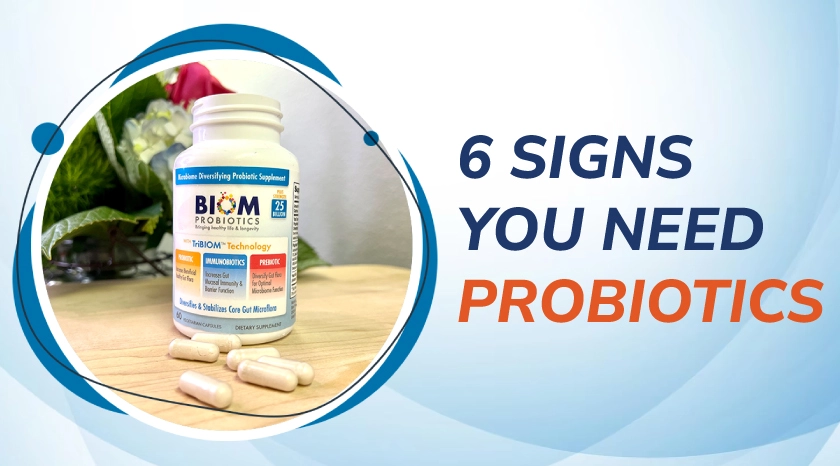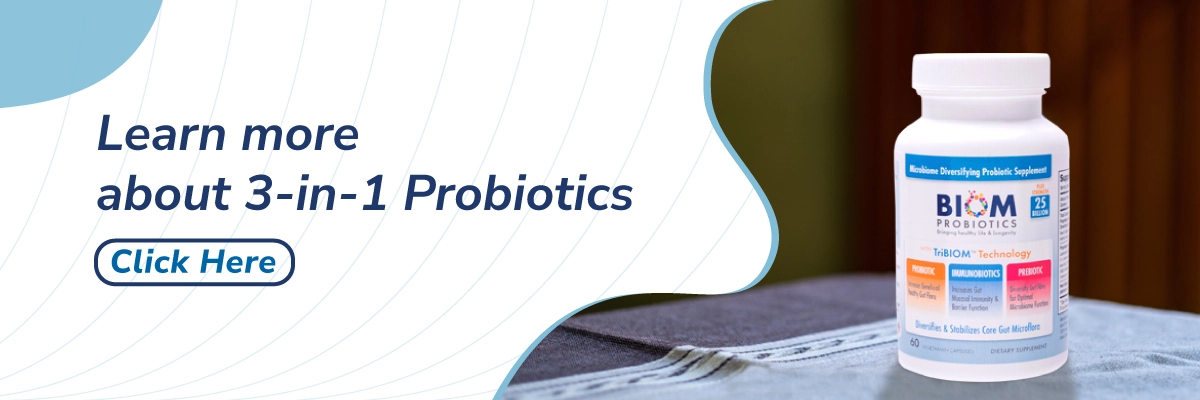Brain fog, Abdominal pain, Chronic fatigue, sleep disturbances, Mood disturbances, depression, or anxiety can all be signs you may need probiotics.
Probiotics help balance the friendly bacteria in your digestive system. They include “good” bacteria that can provide health benefits, including restoring the natural balance of gut bacteria.
An imbalance of gut bacteria means there are too many bad bacteria! This can occur due to illness, medication such as antibiotics, poor diet, etc.
Top 6 symptoms that show “Why do you need probiotics?”
- Difficulty sleeping
- Increased mood swings
- Frequent health issues
- Bowel disorders
- Weight gain
- Skin disorders
Difficulty sleeping
Your gut microbiome can directly interact with the brain through the vagus nerve. Most of this communication is from the gut to the brain. This brain-gut-microbiome axis looks after the secretion of the amino acid tryptophan. This compound assists in converting serotonin (relaxing hormone) into melatonin (sleep hormone).
Serotonin is primarily produced in the gut. Reduced probiotics levels in your body mean less serotonin production and high cortisol (stress hormone) levels.
Suppose your body doesn’t have balanced melatonin levels. In that case, your brain can’t calm down or turn off at night, leading to sleeplessness. If you’re experiencing sleeplessness, it could be a primary sign of a probiotic deficiency.
Increased mood swings
Your gut health and probiotics level are also linked to mood disorders like stress, anxiety, and depression. A study found that the brain-gut connection can impact your mental health by interacting with mood-related hormones and neurotransmitters.
Serotonin and dopamine are the two primary hormones that keep your mood pleasant. However, since these hormones are secreted in the gut, an unhealthy microbiome may produce them in inadequate quantities.
Without enough serotonin, your body releases cortisol, leading to anxiety and panic attacks.
A study showed that probiotics could help with mood disorders to a considerable extent. The probiotic supplements improved anxiety and depression-related symptoms in the participants.

Frequent health issues
A well-balanced and healthy gut microbiome relates to a strong immune system. The good bacteria in your body fight pathogens in various ways. Some outnumber the foreign elements and stop them from growing, while others strengthen the gut.
Probiotics also tackle several pathogens that may invade your body. These bacteria regulate your inflammatory response to fight pathogens, preventing the immune system from attacking your body’s systems and causing allergic disorders. If you catch the flu or colds frequently, you may need to consume more probiotic-rich foods.
Bowel disorders
The apparent signs of an unbalanced microbiome are diarrhea, constipation, and infrequent elimination. Short-term diarrhea is usually caused by food poisoning or a gastroenteritis virus. However, it can also indicate that your gut has fewer friendly bacteria.
Diarrhea makes it hard for you to eliminate waste from your body, which could be due to the overgrowth of harmful bacteria in your gut. Taking probiotic supplements helps treat all major bowel issues, including diarrhea and constipation.
Probiotics are a natural treatment for Irritable Bowel Syndrome (IBS).
Weight gain
A research study found that obese people have different gut bacteria than lean ones. Although little research is available, specific probiotic strains are linked to weight loss.
Probiotics enable the body to break down fats into simpler forms that cells can utilize to gain energy.
If you’re continuously gaining weight, you may have disturbed probiotics levels. Probiotic supplements are an excellent option to reduce body weight, fat percentage, and fat mass. However, it’s better to consult with a nutritionist first.
Skin disorders
Your skin naturally contains several types of bacteria. The good or friendly bacteria in your skin prevent harmful bacteria from settling in your pores and causing issues like acne, eczema, and rosacea.
The best acne treatment is antibacterial products since a specific group of bacteria mostly causes the condition. However, these products usually suppress or kill probiotics, leaving your skin prone to yeast and fungal infections.
Topical treatments of probiotics are found to be effective acne treatments. In addition, probiotic topicals can also help control rosacea flare-ups and eczema.
A study showed that babies are less likely to have eczema when their mothers consume probiotics before and after delivery.
If you notice frequent acne bumps or facial inflammation, you can start taking probiotics at your doctor’s discretion.
Benefits of Probiotics
1. Enhanced Digestive Health: Probiotics balance the microflora in the gut, alleviating discomfort from symptoms like bloating and constipation, especially after food poisoning.
2. Immunity Boost: Our immune system greatly benefits from the balance of good bacteria in our digestive systems. Probiotics significantly boost our body’s defenses, helping fend off viruses and infections.
3. Mood Regulation: With the gut-brain connection evident, studies have shown that our digestive health can influence mood disorders like depression. A balance in serotonin production can help mitigate mood swings and irritability.
4. Heart Health: Consuming probiotics, especially from sources like kefir and yogurt, can lower LDL cholesterol levels, ensuring a more robust metabolism and overall heart health.
5. Allergy and Eczema Reduction: Some study participants have shown a decrease in the severity of allergies and eczema when consuming a proper amount of probiotics.
6. Weight Management: Probiotics, especially from sources like kimchi or kombucha, can help break down fiber, producing compounds beneficial for managing body weight and combating obesity.

Read More: Boost Your Digestion: The Best Digestive Enzyme Supplements
When Do You Need Probiotics?
- After Antibiotic Use: Antibiotics can wreak havoc on gut flora, killing harmful and beneficial bacteria. Probiotics can restore the balance.
- Digestive Disorders: Symptoms like bloating hint at an imbalance in the gut’s microflora.
- Weak Immunity: Falling ill frequently, especially with colds, might indicate needing a probiotic boost.
- Mood Fluctuations: An imbalanced gut can interfere with dopamine and serotonin production, leading to mood disorders.
- Skin Issues: Skin disorders like acne or rosacea may benefit from topical and oral probiotics.
Treatment and Cure Using Probiotics
- Digestive Health: Conditions like IBS may benefit from specific probiotic strains, often available in capsules.
- Antibiotic-Related Diarrhea: Using probiotics during and after antibiotic therapy can act as a solution to reduce the severity of diarrhea.
- Oral Health: Probiotic mouthwashes can aid in maintaining a healthy balance of bacteria in the mouth, defending against infections.
- Skin Health: Topical acne treatments with probiotics can assist in addressing conditions like acne.
However, it’s paramount to consult with a healthcare provider before introducing probiotic supplements to your routine.
What happens to my gut’s microflora when I take antibiotics?
When you consume antibiotics, they can disrupt the natural balance of the microflora in your gut. This can create an imbalance between the good and bad bacteria, leading to various digestive discomforts.
Can probiotics help with mood swings?
Numerous studies have indicated a strong connection between the gut and the brain. By maintaining a balanced microflora, probiotics can help regulate serotonin production, potentially alleviating symptoms of mood disorders and reducing mood swings.
Can food poisoning impact my gut health, and how do probiotics help?
Food poisoning can severely disrupt the balance of bacteria in your gut. Probiotics can aid in restoring this balance, easing discomfort and promoting better digestion.
I am considering adding kefir or yogurt to my diet. Which one offers better probiotic benefits?
Both kefir and yogurt are excellent sources of probiotics. While kefir generally contains a greater diversity of bacteria strains, yogurt is also beneficial. It’s a sense of personal preference and dietary needs.
How do probiotics boost immunity?
Probiotics help maintain a healthy balance of bacteria in your digestive system, which plays a crucial role in immunity. A balanced gut can enhance resistance to viruses and other pathogens.
RESOURCE: https://www.medicinenet.com/what_are_the_signs_you_need_probiotics/article.htm





